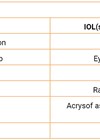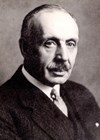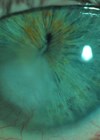Ophthalmology
Foundation Post in Ophthalmology
If you are in your final year of medicine at university, firstly congratulations on making it so far and secondly, you may be wondering how and which jobs to rank highly. If you have found yourself reading this article, then...
Blame the lens – not its position – in refractive surprise
Aetiology of postoperative refractive surprise Weber coined the term “wrong eye, wrong intraocular lens, wrong patient” in 2008 as an aide memoir of major factors believed to underlie refractive surprise – defined as a significant unintended difference between dioptric refraction...
Harry Moss Traquair: Edinburgh Ophthalmologist and Father Figure of Perimetry
It is a unique honour bestowed upon only a few clinicians, that their name becomes for evermore associated with the subject of their particular expertise and knowledge. Such an individual is undoubtedly Harry Moss Traquair, an Edinburgh-based ophthalmologist, who in...
The eye surgeon and eye physician together: the joint ophthalmic clinic
Since the early 19th century, physicians and surgeons have been working together in eye clinics and hospitals to bring about the best outcome for the patients. From the early Babylonian age, important advances in ophthalmic knowledge arose in a stuttered...
My Top Five: Foundation year 3 jobs for prospective ophthalmology candidates
Ophthalmology specialist training (OST) is a fantastic career option, however, it is also a highly competitive specialty. There was a gradual rise in competition ratios in recent years: 3.24 (2019), 5.73 (2020), and 6.80 (2021) [1]. Many choose to pursue...
Use of off-the-shelf magnifying glasses as a cost-effective alternative for surgical loupes
Surgical loupes are an integral part of ophthalmic surgery on the ocular surface and in the periocular area. Available in different magnifications, they provide a clear view of the field of surgery which can greatly assist in identifying fine structures...
Herpes zoster ophthalmicus: a clinician’s perspective
Introduction Herpes zoster, commonly known as shingles, is caused by the reactivation of varicella zoster virus (VZV). The term herpes is derived from a Greek work, herpein, which means ‘creeping’ and the word zoster means a belt or a girdle...
Preparing for modern ophthalmic surgical training as a trainee
As a trainee in ophthalmology, every day you are learning more and more about the specialty. In addition, you will most likely be exploring the vast array of subspecialties that ophthalmology has to offer, and would probably be trying to...
Ophthalmology in a War Zone: an interview with Dr Volodymyr Melnyk
It is now nine months since the full-scale Russian invasion of Ukraine commenced in late February 2022, with Putin announcing a “special military operation” to “denazify and demilitarise” Ukraine. The rest of the world, however, saw it for what it...
How to be ‘appy’ on call: a brief guide to mobile phone applications for the on-call ophthalmologist
One of the unexpected outcomes of the COVID-19 pandemic has been an increased reliance and integration of computer technology within hospital medicine. The need for stricter infection control policies during and after lockdown has seen a boom in technology utilisation....
Ocular manifestations of multiple sclerosis: an overview
Multiple sclerosis (MS) is an autoimmune demyelinating disease of the central nervous system (CNS), in which there is dissemination of lesions in time (two or more clinical events) and space (multiple lesions seen on brain and spinal imaging). The pathophysiology...
Post-stroke visual impairment: how big is the problem, how do we identify it, what we can do about it, and why does it matter?
In the UK, 100,000 new strokes occur each year, with 1.3 million stroke survivors [1]. This article will focus on post-stroke visual impairment, discussing topics of how common it is, how it can be detected, possible management options and how...















